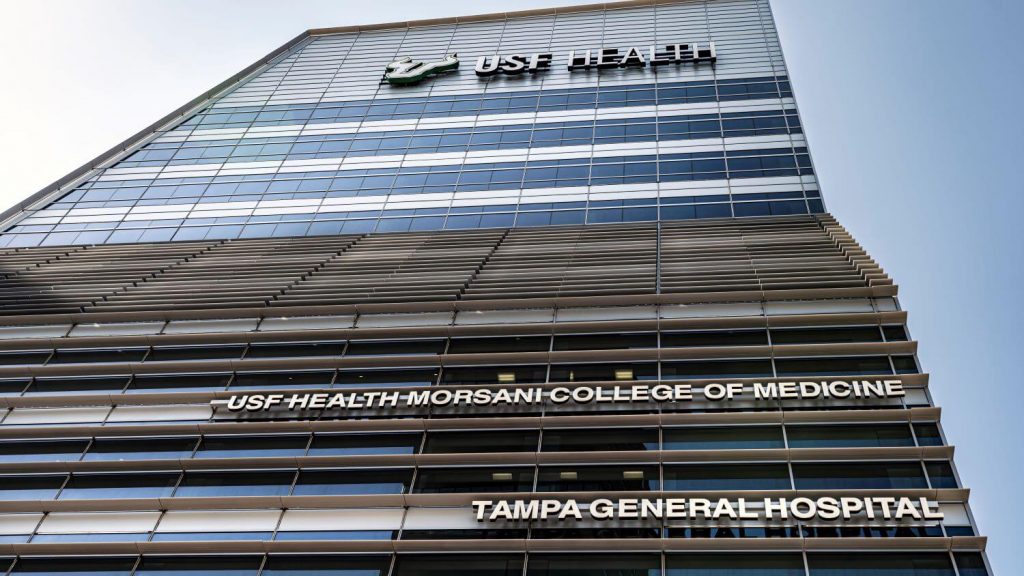USF Health’s Morsani College of Medicine is pleased to announce that the 100% online MS in Health Informatics and MSHI Healthcare Analytics programs are now CAHIIM accredited. CAHIIM defines health informatics as an interprofessional specialty in which the main connected disciplines are information science and technology, health and social and behavioral science.
Health informatics is heavily data-based — which is where the healthcare analytics concentration of the MS in Health Informatics degree excels in training professionals for a variety of data-focused health informatics positions — and relies upon scientific inquiry and problem solving to improve patient care.
What Does CAHIIM Accredited Mean?
The Commission on Accreditation for Health Informatics and Information Management Education, or CAHIIM, strives to “provide innovative leadership that drives enhanced workforce competence by ensuring educational excellence.” Accreditation is an important evaluation process for degree programs and verifies that the curriculum, professional relevance and rigor meet the organization’s high standards.
The CAHIIM Accreditation Process
The accreditation review process is rigorous with stringent guidelines for qualification. The accreditation process goes as follows:
- Letter of intent (LOI). There are basic requirements to meet for application. Once a program has met them, the President takes the first step by submitting an LOI detailing program support, the need the program fills, the expected graduation date for the first class and other basic programmatic information.
- Submit an application. There are six documents that must be filled out and submitted as part of the initial application:
- CAHIIM Self Evaluation Tool (CSET). One introductory course and one upper-level course must be completed in the CSET, which diagrams out the curriculum and value of the courses.
- Syllabi. Specifically, the syllabi for the two courses detailed in the CSET.
- Program director curriculum vitae (CV). A current CV for the program director; employment must be up to date.
- Faculty CV. An up-to-date CV for the full-time faculty member responsible for teaching in the program.
- Synopsis of curriculum. A list of the program’s full curriculum, including courses, sequence and schedule.
- Profile page. A general contact and information page for the program.
- Application review. Within 90 days, the completed application undergoes review by CAHIIM staff.
- Candidacy Status. If the application is accepted, the program is granted Candidacy Status and gets assigned an EPC code and self-assessment due date. Programs may be denied if it doesn’t meet application conditions or fall out of compliance with the most recent Standards.
- Program self-assessment. By the assigned deadline — a year from being granted Candidacy Status — faculty must submit a completed Self-Assessment. In addition to full access to all online course content, this step also requires:
- Program Evaluation Plan
- Student and Graduate Table
- Faculty Table
- Synopsis of Curriculum
- Learning Management System
- Budget Template
- Self-assessment review. CAHIIM staff reviews the program’s Self-Assessment within 90 days.
- Site visit. A site visit team meets with program officials to evaluate and ensure that the program conforms to CAHIIM Accreditation Standards. They generate a report within 10 days of the visit’s conclusion.
- Responding to the site visit report. The program director has 30 days to issue a formal response.
- Council review. The CAHIIM accreditation council reviews the response from the program and makes a recommendation for or against accreditation status.
- Board of directors review. The CAHIIM board of directors reviews the council’s motion and makes a final vote.
- Progress report. Programs must maintain accreditation through progress reports if there are any deficiencies.
As of 2022, USF Health is one of 10 universities in the southeast region and one of 25 schools nationally with an accredited MSHI program through CAHIIM — one of many honors USF Health’s MSHI program holds. As the first online health informatics graduate program in the U.S. offered through a medical school, other notable achievements include:
- Value Colleges — Ranked 1st in 2022 Top 50 Master’s in Health Informatics Programs
- Best Colleges — Ranked 4th in 2021 Best Online Master’s in Health Informatics Programs
- U.S. News & World Report — one of 2022’s Best Medical Schools: Research
Benefits of CAHIIM Accreditation
There are numerous benefits for students enrolled in a CAHIIM accredited program, including:
- Competitive advantage — CAHIIM accreditation signals to prospective employers and students that the degree program is monitored, managed and maintained through accreditation processes that require excellence and may give program graduates a competitive advantage in the workforce.
- Continuous improvement — With the guidance and resources of CAHIIM, educators are held to a high standard that must be met for accreditation. Students can be certain they’re getting a relevant, thorough education in their program.
- Professional events — Students gaining access to related professional events that can help with real-world application and career-related networking.
How Are Programs Evaluated for Accreditation?
For a health informatics graduate program to meet CAHIIM accreditation standards, experts evaluate a program based on:
- Program governance — An evaluation of program leaders, faculty qualifications and professional performance.
- Curriculum — The evaluation of course curriculum includes how well the program incorporates up-to-date information on health informatics issues and topics.
- Sponsorship — The program’s educational institution must have accreditation by an organization recognized by the U.S. Department of Education.
- Systematic planning — An evaluation of the program’s mission and related measurable outcomes to gauge program effectiveness.
USF Health’s CAHIIM Accredited Graduate Programs
USF Health’s Morsani College of Medicine offers two CAHIIM accredited programs, the Master of Science in Health Informatics (MSHI) and the MSHI Healthcare Analytics. These programs are 100% online, allowing students to manage life and work commitments while advancing their education. The 32-credit graduate degree program is designed to support the student’s development of the American Medical Informatics Association’s master’s level competencies in health informatics. Hear from some of our USF Health program graduates in the Spotlights section of our blog.
MS in Health Informatics
USF Health’s Master of Science in Health Informatics (MSHI) addresses both the operational and technological components of informatics while focusing on interoperability and integration of technology. Courses provide the foundational, broad technical skills as well as business and organizational competencies required for senior-level positions.
MSHI Healthcare Analytics
USF Health’s healthcare analytics concentration of the MSHI degree program focuses on the management and the use of healthcare data – a critical component of health informatics. Deep knowledge of healthcare analytics will allow you to make effective use of the vast volume of digital data to improve healthcare operations and delivery.



